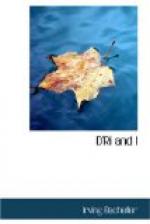“Very truly yours,
“RONLEY.”
To whom it may concern.
“Mme. St. Jovite, the bearer, is on her way to my house at Wrentham, Frontenac County, second concession, with a despatch of urgent character. I shall be greatly favored by all who give her furtherance in this journey.
“Respectfully, etc.,
“Ronley,
“Colonel
of King’s Guard.”
For fear of a cipher, the general gave tantamount terms for each letter, and his Lordship rewrote them.
“I thought the name St. Jovite would be as good as any,” he remarked.
The rendezvous was carefully mapped. The guard came, and his Lordship rose languidly.
“One thing more,” said he. “Let the men go over without arms—if—if you will be so good.”
“I shall consider that,” said the general.
“And when shall the messenger start?”
“Within the hour, if possible,” my chief answered.
As they went away, the general sat down with me for a moment, to discuss the matter.
XXII
Herein is the story of the adventures of his Lordship’s courier, known as Mme. St. Jovite, on and after the night of November 17, 1813, in Upper Canada. This account may be accepted as quite trustworthy, its writer having been known to me these many years, in the which neither I nor any of my friends have had occasion to doubt her veracity. The writer gave more details than are desirable, but the document is nothing more than a letter to an intimate friend. I remember well she had an eye for color and a taste for description not easy to repress.
When I decided to go it was near midnight, The mission was not all to my taste, but the reward was handsome and the letter of Lord Ronley reassuring. I knew I could do it, and dressed as soon as possible and walked to the Lone Oak, a sergeant escorting. There, as I expected, the big soldier known as D’ri was waiting, his canoe in a wagon that stood near. We all mounted the seat, driving pell-mell on a rough road to Tibbals Point, on the southwest corner of Wolf Island. A hard journey it was, and near two o’clock, I should say, before we put our canoe in the water. Then the man D’ri helped me to an easy seat in the bow and shoved off. A full moon, yellow as gold, hung low in the northwest. The water was calm, and we cut across “the moon way,” that funnelled off to the shores of Canada.
“It is one ver’ gran’ night,” I said in my dialect of the rude Canuck; for I did not wish him, or any one, to know me. War is war, but, surely, such adventures are not the thing for a woman.
“Yis, mahm,” he answered, pushing hard with the paddle. “Yer a friend o’ the cap’n, ain’t ye—Ray Bell?”
“Ze captain? Ah, oui, m’sieu’,” I said. “One ver’ brave man, ain’t it?”
“Yis, mahm,” said he, soberly and with emphasis. “He ’s more ’n a dozen brave men, thet’s whut he is. He’s a joemightyful cuss. Ain’t nuthin’ he can’t dew—spryer ’n a painter, stouter ’n a moose, an’ treemenjous with a sword.”




